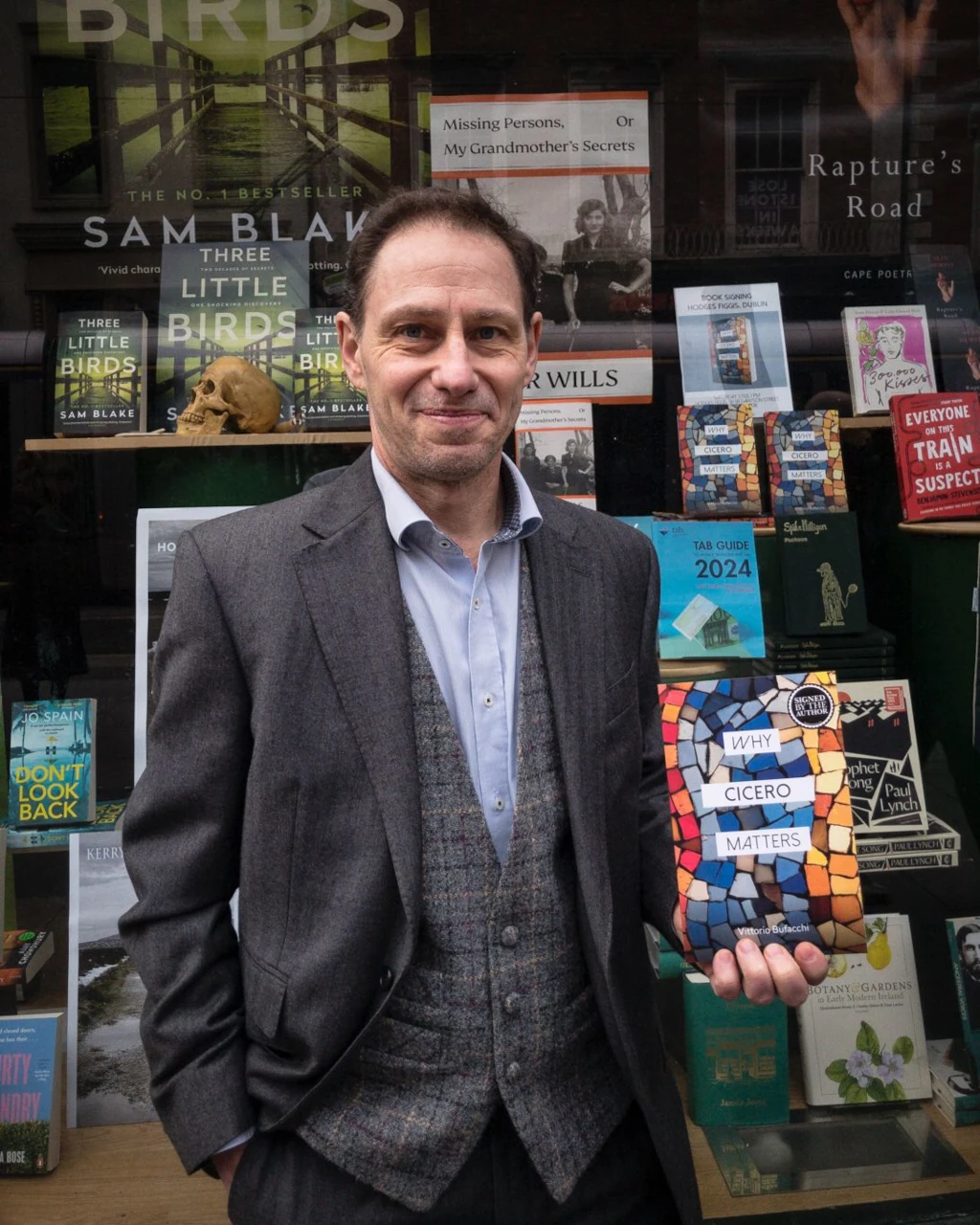Prof. Vittorio Bufacchi on Why Cicero Matters: Ancient Lessons for Modern Democracy

In his new book, Why Cicero Matters, Professor Bufacchi revisits Roman political philosophy to address modern threats to democracy. Alongside this, he highlights rising threats to academic freedom, insisting that defending open dialogue and free speech is crucial to resisting authoritarianism and preserving democratic values.
Now a professor specialising in political philosophy at University College Cork, Prof. Bufacchi’s journey began with a PhD at the London School of Economics. Since then, he has taught in the UK, the US, and now Ireland, teaching students about his area of focus, political philosophy, while also teaching moral philosophy, and the history of ideas. Most of his work focuses on contemporary political philosophy, ‘Most of the philosophers I work on are still alive,’ he notes.
However, his latest book, ‘Why Cicero Matters’, takes a bold step back more than 2,000 years to ancient Rome. Here, he explores pressing modern questions about democracy, power, and political responsibility through the lens of Marcus Tullius Cicero, a philosopher who also served as consul, the highest political position in the Roman Republic.
 Photo: Prof. Vittorio Bufacchi and his book Why Cicero Matters
Photo: Prof. Vittorio Bufacchi and his book Why Cicero Matters
‘Cicero is remarkable,’ Prof. Bufacchi notes, ‘because his philosophy informed his politics, and his politics also deeply influenced his philosophy.’
Cicero lived during the final years of the Roman Republic, one of the earliest political systems grounded in elections, the rule of law, and checks and balances. These checks and balances were designed to prevent any one person from gaining too much power. Cicero was a passionate defender of this constitutional system, dedicating his life to resisting authoritarian populists who sought to undermine the Republic. Ultimately, however, the Republic fell to figures like Julius Caesar, who wanted to hold all the power.
Prof. Bufacchi sees a clear parallel between this history and today’s global politics. ‘Figures like Trump, Meloni in Italy, and others are seriously pushing the limits of democracy,’ he observes. In a recent article for The Conversation UK, titled ‘A Short History of the Separation of Powers: From Cicero’s Rome to Trump’s America,’ he discusses how modern leaders continue to erode the checks and balances meant to protect democracy. He notes how Donald Trump often bypassed Congress by issuing executive orders.
‘We don’t need to reinvent the wheel,’ Bufacchi insists. ‘The lessons are already there in history.’ Prof. Bufacchi’s book ‘Why Cicero Matters’ further investigates these parallels, drawing important lessons from Cicero’s political and philosophical legacy.
Prof. Bufacchi’s concern with the erosion of democratic norms, explored in ‘Why Cicero Matters’, also extends to a warning about growing threats to academic freedom.
Prof. Bufacchi refers back to Cicero, who believed that philosophy fosters understanding of democracy through dialogue, as it teaches us to listen, argue, and seek truth together. In an era of increasing authoritarianism and diminishing civil discourse, Prof. Bufacchi sees this as an urgent reminder: authoritarian figures in power don’t want dialogue, they claim to know the truth and anyone who disagrees with them gets punished. This is also why Prof. Bufacchi goes out of his way to do interviews and write news articles in accessible language: to ensure his work reaches people, whether they agree or disagree.
Prof. Bufacchi was recently promoted to professor, a milestone he addresses with thoughtful reflection. When asked about the promotion, he states, ‘It’s about privilege. I’m a white, middle-class, European man. That’s a huge amount of structural advantage.’ At the same time, he sees his position as an opportunity to promote justice whenever possible.
Looking ahead, Prof. Bufacchi is working on several new projects. In recent years, he also wrote a book on COVID and philosophy, published in 2021, and a piece on ‘Hannah Arendt and the war in Gaza’, examining how to apply political and post-truth perspectives. He is currently writing a manuscript on the philosophical foundations of human rights and hopes, in the future, to write about Marxism and Antonio Gramsci. Gramsci was an Italian philosopher imprisoned by Mussolini’s fascist regime. Prof. Bufacchi explains that, as fascism might recur in the near future again, he is interested in writing about someone who stood and suffered for his ideas. Despite his ambitious projects, Prof. Bufacchi keeps a realistic perspective: ‘So, will I get all this stuff finished? Who knows?’ he laughed. No doubt he will, as Prof. Bufacchi is a man on a mission, and knows it!
UCC Research Staff Association
Contact us
C/O Hydraulics and Maritime Research Centre, Pouladuff Rd, Togher (UCC Internal)
